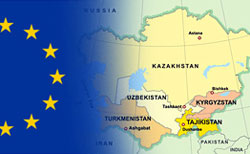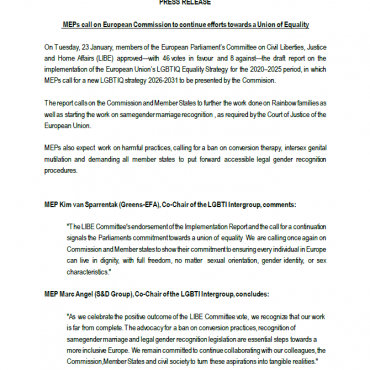Central Asia: European Parliament concerned about state of LGBTI rights
In a report adopted last week on the EU’s relationship with Central Asia, the European Parliament has made a strong call to respect democracy, the rule of law and human rights, including the rights of LGBTI people, in the region.
 The report highlights the parliament’s concern over freedom of the media, freedom of expression, and freedom of assembly and association. It specifically highlights its concern over anti-propaganda bills that have been considered by Kyrgyzstan and Kazakhstan (par. 36 and 151).
The report highlights the parliament’s concern over freedom of the media, freedom of expression, and freedom of assembly and association. It specifically highlights its concern over anti-propaganda bills that have been considered by Kyrgyzstan and Kazakhstan (par. 36 and 151).
In Kazakhstan both parliamentary houses passed the draft law “On Protecting Children from Information Harmful to their Health and Development”, before the Constitutional Council rejected the bill due to the vague wording in May last year.
Kyrgyzstan’s Parliament considered a bill banning “propaganda of non-traditional sexual relations,” which has been withdrawn before its final reading for additional consultation, but is expected to be returned to Parliament.
Furthermore, the report calls on the authorities of all countries in the region to end discrimination and enforce the rights of LGBTI persons (par. 37).
Daniele Viotti MEP, Co-President of the Intergroup on LGBTI Rights and part of the European Parliament’s Central Asia Delegation, reacted: “I strongly welcome that the propaganda bills in Kazakhstan and Kyrgyzstan have been withdrawn. They are discriminatory, and should never have been drafted in the first place.”
“However, the damage is partly already done, with hate crimes and political hate speech on the rise. I strongly urge my fellow law-makers in Kyrgyzstan and Kazakhstan to stop targeting minorities, and instead work to end discrimination and enforce their rights.”
Malin Björk MEP, Vice-President of the LGBTI Intergroup, continued: “The initiatives aimed at LGBTI people do not stand alone, but take place in an environment where government critics are imprisoned, and independent groups and opposition parties are silenced.”
“I urge the Commission and the EEAS to take the European Parliament’s call seriously and raise this at the highest levels with the countries’ authorities.”
Read more:






